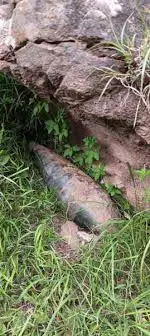‘What if it explodes?’: In Poonch, Pakistan shelling is over but some fear remains

Poonch, Jammu and Kashmir — After days of heavy shelling from across the Line of Control (LoC), Poonch is finally experiencing a fragile calm. The sounds of exploding shells and hurried evacuations have stopped. But beneath this silence, fear still lingers. Many residents now face a hidden danger—unexploded bombs scattered around their homes, fields, and roads.
The Hidden Danger of Unexploded Shells
Unexploded shells are one of the deadliest legacies left behind by the conflict. Even though the firing has stopped, these bombs remain buried in the soil or debris. Locals worry that a simple mistake could trigger a deadly explosion.
Abdul Samad, a 45-year-old farmer, found a shell in his field shortly after the shelling stopped. “I was scared,” he says. “I didn’t know what it was at first. When I found out, I called the army immediately.” The army safely removed the shell, but Abdul still fears there are more hidden bombs.
Army teams and bomb disposal squads are working hard to clear these explosives. The work is slow and dangerous. “These shells can explode without warning,” a senior army officer explains. “Sometimes they lie dormant for months or years, making them even more dangerous.”
Fear Affects Everyday Life
The psychological impact of the shelling is clear. People in Poonch are anxious and stressed. The threat of unexploded bombs keeps many indoors.
Children are especially affected. Parents worry about their safety and are hesitant to send them back to school. Even though schools are reopening, attendance is low because families fear for their children.
Rashida Bano, a schoolteacher, shares, “The children ask if the bombs are still there. They are afraid to come back to school. We try to teach them about safety, but the fear is strong.”
Adults face challenges too. Farmers hesitate to fully work their fields, fearing they might disturb hidden explosives. Markets operate, but fewer people are visiting. The local health clinic reports more cases of stress and sleeplessness linked to the recent violence.
Community Efforts to Restore Safety
Despite these hardships, the people of Poonch are showing resilience. Community leaders and volunteers have launched awareness campaigns. They warn people not to touch suspicious objects and to report them immediately.
NGOs have started counseling programs to help families and children cope. Farooq Ahmed, who works with a local relief group, says, “Peace means feeling safe in your home and community, not just the absence of gunfire.”
Hope on the Horizon
The ceasefire brings cautious optimism. While many residents remain skeptical about lasting peace along the LoC, they welcome the break in violence.
Meena Kumari, a local teacher, says, “Peace will take time. But we hope this silence lasts. Our children deserve to grow up without fear of bombs.”
The Larger Reality of Life on the LoC
Poonch’s experience highlights the fragile nature of peace along the LoC. Ceasefires are often brief and can be broken by sudden violence. This region, heavily militarized and often contested, has seen repeated cycles of conflict.
Until a lasting diplomatic solution is found, border communities like Poonch will continue to face danger. Both the physical threat of unexploded bombs and the emotional toll will persist.
Moving Forward: Safety and Healing
The immediate priority is clearing unexploded ordnance. This will allow people to live without constant fear. The government and military are working on this, but more resources are needed.
Humanitarian groups focus on trauma counseling and education to prevent accidents. They hope to help people heal and break the cycle of fear.
Poonch’s story is one of hardship but also of hope. Its people are determined to rebuild their lives and seek peace—even as the echoes of conflict remain buried beneath their feet.






